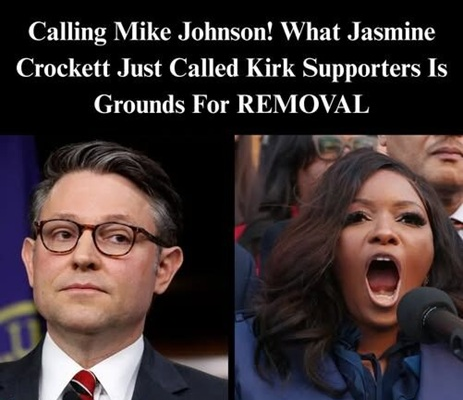Washington, D.C. — U.S. Representative Jasmine Crockett (D–TX) is under intense scrutiny after publicly defending comments in which she compared former President Donald Trump to Adolf Hitler during a recent appearance on The Breakfast Club, a nationally syndicated radio show. Her statements come at a particularly sensitive time, following the high-profile assassination of conservative political commentator Charlie Kirk in Salt Lake City, Utah—a tragedy that has reignited a fierce national conversation about the role political rhetoric plays in shaping a climate potentially conducive to violence.
Crockett’s Justification for Her Remarks. During the interview, Rep. Crockett acknowledged that her comments were intentionally provocative, but argued they were based on legitimate concerns about the former president’s rhetoric and behavior. She referred to several past incidents involving Trump, including his now-infamous 2016 campaign statement claiming he could “stand in the middle of Fifth Avenue and shoot somebody” without losing support, as well as his repeated encouragement of aggressive behavior at political rallies.
“I understand that some people believe my words were too strong,” Crockett said. “But we cannot ignore the fact that Donald Trump’s own rhetoric has consistently normalized hostility and even glorified violence. My comments were not meant to be taken as a literal comparison to Hitler, but rather to highlight authoritarian patterns I find deeply troubling in his leadership style.” Crockett maintained that her intention was not to inflame tensions but to provoke necessary reflection on how dangerous rhetoric from influential political figures can erode democratic norms and fuel polarization.
Political Reactions and Public Criticism
Rep. Crockett’s remarks triggered a swift and widespread backlash, particularly from Republican lawmakers and conservative commentators. Many accused her of engaging in the very kind of extreme rhetoric that Democrats frequently denounce. Critics argue that invoking comparisons to figures like Hitler—even as a metaphor—is deeply irresponsible and risks further dehumanizing political opponents.
“Equating a former president of the United States to one of history’s most evil dictators crosses a moral and political line,” said one Republican House member, speaking to Politico. “Especially in the aftermath of an act of political violence, language like this only throws fuel on the fire.”
Across the political spectrum, there is growing concern about the escalating tone of political discourse in the United States. Some Democrats, while supporting Crockett’s broader message, have also expressed unease about using historical analogies that can be inflammatory or misunderstood. Others point to prior examples of hostile language from leaders on both sides of the aisle as contributing factors to an increasingly toxic political culture.
Even President Joe Biden has not been immune to criticism. In a previous campaign event, he joked that he would have liked to “take Trump behind the gym”—a comment that some say exemplifies how casual rhetoric can feed into broader narratives of political antagonism and personal hostility.
The National Tragedy Behind the Debate
The conversation around political speech has taken on new urgency following the tragic killing of Charlie Kirk, a high-profile conservative activist and media figure. The suspect in the case, 18-year-old Tyler Robinson, was reported by former classmates and neighbors to have exhibited signs of growing political radicalization in recent years, though investigators have not yet confirmed a specific motive for the attack.
While law enforcement continues its investigation, many observers see the incident as a stark example of how extremist views—nurtured in online echo chambers or inflamed by political rhetoric—can manifest in real-world violence. Former President Trump, speaking on Fox & Friends, condemned the assassination but also criticized what he described as a “dangerous double standard” in how political language is evaluated, arguing that Democrats often escape accountability for incendiary remarks while Republicans are disproportionately blamed.
Words, Consequences, and the Line Between Criticism and Harm
At the heart of the controversy surrounding Rep. Crockett’s comments is a broader and increasingly urgent question: Where is the line between legitimate political critique and rhetoric that endangers public safety? In a democracy, strong language and passionate disagreement are expected—and even necessary—for robust political debate. But when speech begins to shift from critique to demonization, the consequences can extend beyond the realm of discourse and into real-life actions.
Rep. Crockett’s decision to stand by her remarks ensures that the debate over political language will remain front and center. For a country already struggling with deep divisions and rising incidents of politically motivated violence, her comments—and the reactions they have provoked—serve as a stark reminder: words matter. They shape public opinion, influence behavior, and in extreme cases, may contribute to an environment where violence no longer seems unthinkable.
Washington, D.C. — U.S. Representative Jasmine Crockett (D–TX) is under intense scrutiny after publicly defending comments in which she compared former President Donald Trump to Adolf Hitler during a recent appearance on The Breakfast Club, a nationally syndicated radio show. Her statements come at a particularly sensitive time, following the high-profile assassination of conservative political commentator Charlie Kirk in Salt Lake City, Utah—a tragedy that has reignited a fierce national conversation about the role political rhetoric plays in shaping a climate potentially conducive to violence.
Crockett’s Justification for Her Remarks. During the interview, Rep. Crockett acknowledged that her comments were intentionally provocative, but argued they were based on legitimate concerns about the former president’s rhetoric and behavior. She referred to several past incidents involving Trump, including his now-infamous 2016 campaign statement claiming he could “stand in the middle of Fifth Avenue and shoot somebody” without losing support, as well as his repeated encouragement of aggressive behavior at political rallies.
“I understand that some people believe my words were too strong,” Crockett said. “But we cannot ignore the fact that Donald Trump’s own rhetoric has consistently normalized hostility and even glorified violence. My comments were not meant to be taken as a literal comparison to Hitler, but rather to highlight authoritarian patterns I find deeply troubling in his leadership style.” Crockett maintained that her intention was not to inflame tensions but to provoke necessary reflection on how dangerous rhetoric from influential political figures can erode democratic norms and fuel polarization.
Political Reactions and Public Criticism
Rep. Crockett’s remarks triggered a swift and widespread backlash, particularly from Republican lawmakers and conservative commentators. Many accused her of engaging in the very kind of extreme rhetoric that Democrats frequently denounce. Critics argue that invoking comparisons to figures like Hitler—even as a metaphor—is deeply irresponsible and risks further dehumanizing political opponents.
“Equating a former president of the United States to one of history’s most evil dictators crosses a moral and political line,” said one Republican House member, speaking to Politico. “Especially in the aftermath of an act of political violence, language like this only throws fuel on the fire.”
Across the political spectrum, there is growing concern about the escalating tone of political discourse in the United States. Some Democrats, while supporting Crockett’s broader message, have also expressed unease about using historical analogies that can be inflammatory or misunderstood. Others point to prior examples of hostile language from leaders on both sides of the aisle as contributing factors to an increasingly toxic political culture.
Even President Joe Biden has not been immune to criticism. In a previous campaign event, he joked that he would have liked to “take Trump behind the gym”—a comment that some say exemplifies how casual rhetoric can feed into broader narratives of political antagonism and personal hostility.
The National Tragedy Behind the Debate
The conversation around political speech has taken on new urgency following the tragic killing of Charlie Kirk, a high-profile conservative activist and media figure. The suspect in the case, 18-year-old Tyler Robinson, was reported by former classmates and neighbors to have exhibited signs of growing political radicalization in recent years, though investigators have not yet confirmed a specific motive for the attack.
While law enforcement continues its investigation, many observers see the incident as a stark example of how extremist views—nurtured in online echo chambers or inflamed by political rhetoric—can manifest in real-world violence. Former President Trump, speaking on Fox & Friends, condemned the assassination but also criticized what he described as a “dangerous double standard” in how political language is evaluated, arguing that Democrats often escape accountability for incendiary remarks while Republicans are disproportionately blamed.
Words, Consequences, and the Line Between Criticism and Harm
At the heart of the controversy surrounding Rep. Crockett’s comments is a broader and increasingly urgent question: Where is the line between legitimate political critique and rhetoric that endangers public safety? In a democracy, strong language and passionate disagreement are expected—and even necessary—for robust political debate. But when speech begins to shift from critique to demonization, the consequences can extend beyond the realm of discourse and into real-life actions.
Rep. Crockett’s decision to stand by her remarks ensures that the debate over political language will remain front and center. For a country already struggling with deep divisions and rising incidents of politically motivated violence, her comments—and the reactions they have provoked—serve as a stark reminder: words matter. They shape public opinion, influence behavior, and in extreme cases, may contribute to an environment where violence no longer seems unthinkable.




